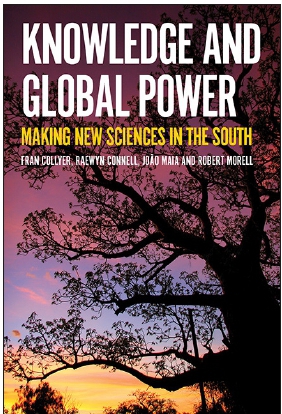Serviços Personalizados
Artigo
Indicadores
Links relacionados
-
 Citado por Google
Citado por Google -
 Similares em Google
Similares em Google
Compartilhar
SAMJ: South African Medical Journal
versão On-line ISSN 2078-5135
versão impressa ISSN 0256-9574
SAMJ, S. Afr. med. j. vol.109 no.10 Pretoria Out. 2019
IZINDABA
BOOK REVIEW
Knowledge and Global Power: Making New Sciences in the South

By Fran Collyer, Raewyn Connell, Joäo Maia and Robert Morell. Johannesburg: Wits University Press, 2019. ISBN: 978-1-925495-76-8 (pbk), 978-1925495-78-2 (e-book)
This is a very interesting and valuable contribution on the geopolitics of power in knowledge production, about the dominance of the Global North, especially the USA, and Global South counter-strategies. It is an important read for those in health research and practice.
The book focuses on three newer knowledge domains, HIV/AIDS, gender and climate change, examining whether historical patterns of knowledge inequality continue. For SAMJ readers, research conducted in HIV/AIDS will be of particular interest. Here, old patterns of knowledge inequality have changed. South Africa (SA) 'punches way about its weight', and has produced the third most global research, after the USA and the UK. This is impressive, given the unequal resources. SA is at the centre of the global epidemic, and its doctors, researchers and activists drove the research agenda as they sought to save lives by pressuring government to implement a programme of antiretrovirals. In doing this, SA has contributed new clinical and public health knowledge and approaches globally.
The book comprises seven chapters. Each has a useful summary at the end, capturing the key take-away points. The introductory chapter provides an overview of the book's contents and arguments. Chapter 1 introduces the knowledge economy and who is in it, providing a useful resource for research methods, teaching and learning. Chapter 2 explores domains of knowledge and their origins. Chapter 3 presents research interview data on topical areas: a South African centre
on climate change, an Australian gender unit and a Brazilian AIDS centre. All survive on their own funding, with concomitant staff overwork, multitasking, and pressure to publish internationally. Chapter 4 uses statistical mapping data to show that publishing in Global North journals and retrieval through northern databases is most valued. Chapter 5 examines the circulation of knowledge through mostly high-profit publishing companies with headquarters in the Global North. A critical part of this chapter documents responses and strategies to overcome the exploitative nature of these publishing companies.
Chapter 6 contributes a less documented and important focus on Global South challenges to Global North knowledge production dominance and inequalities in funding and trained and skilled staff. Class, race and gender influence the existing workfields. Chapter 7 concludes by summarising the key findings and implications.
Using soft and hard data, this book is a very thorough investigation of global knowledge and power, its impact, and its challenges to and reshaping of Global South knowledge creation and research.,
Diane Cooper
School of Public Health, University of the Western Cape, Cape Town, South Africa dcooper@uwc.ac.za














